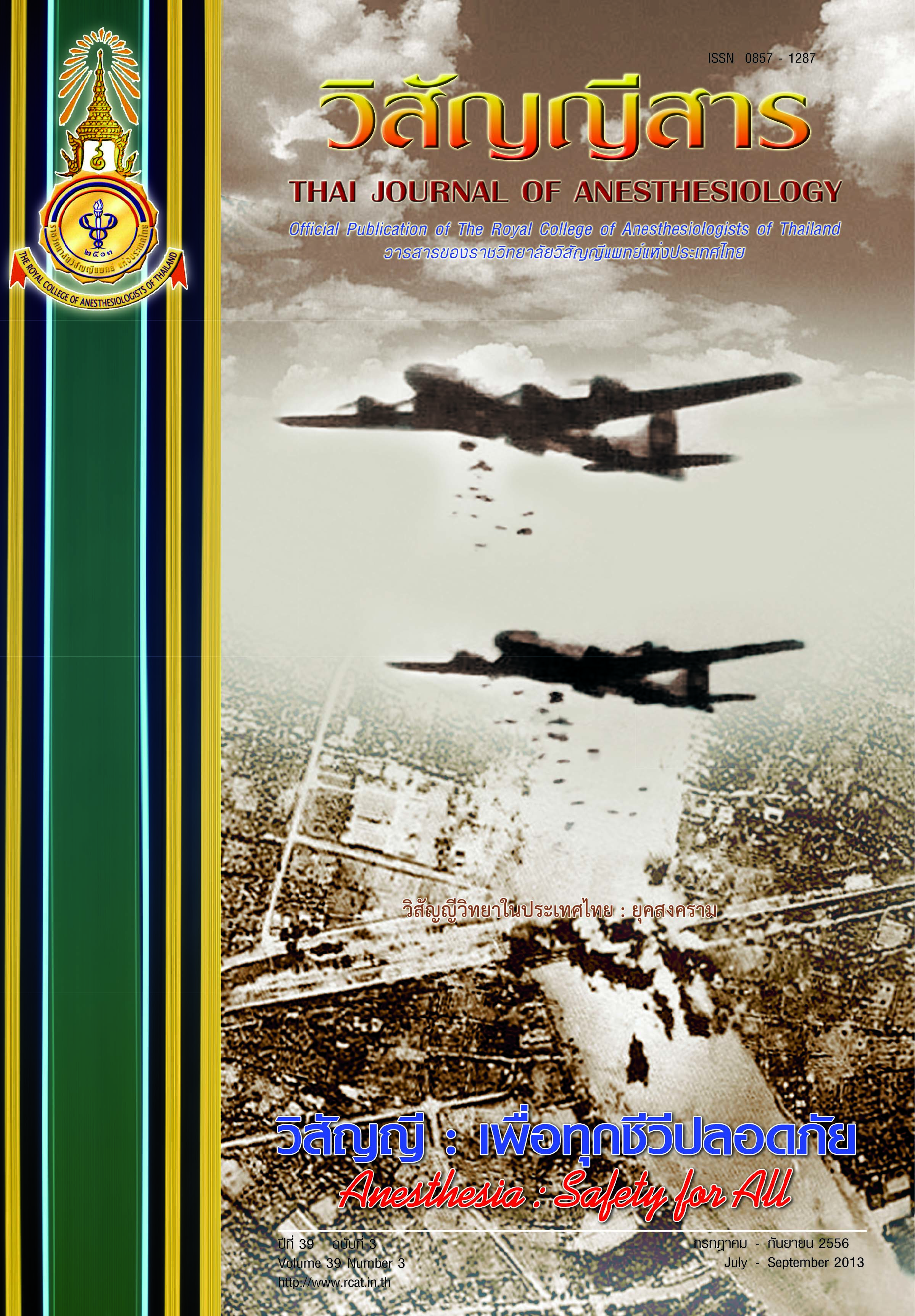Knowledge Assessment of Practical Nurses on the Measurement of Oxygen Saturation Level in Arterial Blood and Automatic Blood pressure
Main Article Content
Abstract
Background: The main causes of death at the initial phase of the postoperative period are respiratory and cardiovascular complications. Therefore, anesthetic team including practical nurses that take care of patients in Post Anesthesia Care Unit (PACU) should have expertise in detecting respiratory and cardiovascular complications. For this reason, it is obligatory that the practical nurses are well-trained in using medical devices that measure the oxygen saturation level in arterial blood and non-invasive blood pressure.
Objectives: This study is conducted to assess knowledge and factors that affect the knowledge of practical nurses on the measurement of oxygen saturation level in arterial blood and the automatic blood pressure.
Methods: Two short time workshops on the measurement of oxygen saturation level in arterial blood and the automatic measurement of blood pressure was arranged for all of 27 practical nurses working at the Department of Anesthesiology, Ramathibodi Hospital. The studied subjects’ knowledge was tested before and after taking the short time workshops.
Results: The practical nurses scored significantly higher after taking the short time workshops. There was a correlation which was statistical significant between working experience and their pre - test scores on measurement of automatic blood pressure. Moreover, the correlation between age and their pos - test scores on measurement of automatic blood pressure was also statistically significant.
Conclusion: Although experiences improve practical nurses ‘knowledge, short time workshops improved their knowledge faster. Therefore, these short time workshops should be arranged in all PACU to improve the knowledge of the practical nurses.
ประเมินความรู้ผู้ช่วยพยาบาล เรื่องการวัดความอิ่มตัวของออกซิเจน ในเลือดแดง และการวัดความดันเลือดอัตโนมัติ
บทนำ: สาเหตุส่วนใหญ่ของการเสียชีวิตในผู้ป่วยระยะแรกหลังการผ่าตัดเกิดจากภาวะแทรกซ้อน ของระบบทางเดินหายใจและระบบไหลเวียนเลือด ดังนั้นผู้ช่วยพยาบาลที่ร่วมให้การดูแลผู้ป่วยหลังการระงับ ความรู้สึกในห้องพักฟื้น (Post Anesthesia Care Unit : PACU) จะต้องมีความรู้ ความชำนาญ ในการเฝ้าระวัง และสามารถวินิจฉัยภาวะแทรกซ้อนต่าง ๆ ที่อาจเกิดขึ้นได้ รวมถึงสามารถใช้ เครื่องวัดความอิ่มตัวของ ออกซิเจนในเลือดแดงและเครื่องวัดความดันเลือดอัตโนมัติ ได้เป็นอย่างดี
วัตถุประสงค์: เพื่อศึกษาระดับ ความรู้และปัจจัยที่มีผลต่อความรู้ของผู้ช่วยพยาบาลเรื่องการวัดความอิ่มตัวของออกซิเจนในเลือดแดง การวัดความดันเลือดอัตโนมัติ
วิธีการศึกษา: จัดการอบรมเรื่องการวัดความอิ่มตัวของออกซิเจนในเลือดแดง และการวัดความดันเลือดอัตโนมัติ ให้กับผู้ช่วยพยาบาลทุกคนในภาควิชาวิสัญญีวิทยา คณะแพทยศาสตร์ โรงพยาบาลรามาธิบดี จำนวน 27 คนและประเมินความรู้ก่อนและหลังการจัดอบรม
ผลการศึกษา: พบว่าคะแนน หลังเรียนของทั้งสองวิชามากกว่าคะแนนก่อนเรียนอย่างมีนัยสำคัญทางสถิติ โดยระยะเวลาทำงานเป็นปัจจัย ที่สัมพันธ์กับคะแนนการวัดความดันเลือดอัตโนมัติก่อนเรียน และอายุเป็นปัจจัยที่สัมพันธ์ กับคะแนนการ วัดความดันเลือดอัตโนมัติหลังเรียนอย่างมีนัยสำคัญทางสถิติ
สรุป: ถึงแม้ว่าระยะเวลาการทำงานที่มากขึ้นจะมี ผลให้ผู้ช่วยพยาบาลมีความรู้เพิ่มขึ้น แต่การจัดฝึกอบรมจะช่วยเพิ่มความรู้ได้ในเวลาอันสั้น ดังนั้นห้องพักฟื้นต่างๆ จึงควรจัดให้มีการฝึกอบรมแบบนี้ขึ้นเพื่อพัฒนาความรู้ของผู้ปฏิบัติงานในหน่วยงานของตนเอง


